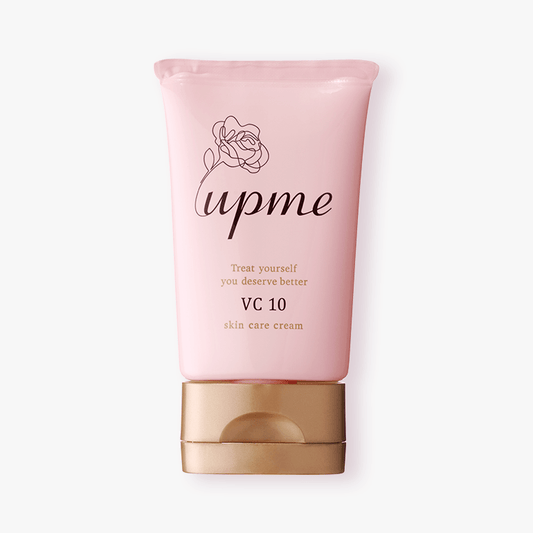
Tips for taking care of sensitive areas during shower time
Thank you for visiting our website.
Researched and developed by 95 doctors
Contains 10% of our proprietary stable neutral vitamin C derivative
Carefully crafted Femcare brand cream
I'm Sato, a staff member at "up me".

Intimate area care is an often overlooked area of total body care, yet maintaining the health of your intimate areas has a huge impact on your overall health and wellbeing.
This guide will show you how to take better care of your intimate areas during your shower. From the importance of pH balance to proper cleaning and moisturizing techniques, we'll cover everything from the secrets of how to care for your intimate areas to how to moisturize your skin. We'll also be chock full of expert advice and tips on which products to choose. So, start taking better care of your intimate areas today!
The importance of the delicate zone
The private parts of the body play an important role in maintaining physical health. First, they have the function of expelling waste products from the body, such as urine and menstrual blood. In addition, the genitals are an essential part of reproductive function, and healthy sexual function also affects mental and physical health. Furthermore, the private parts of the body also have a barrier function that prevents the invasion of bacteria, viruses, and other harmful substances.
The benefits of taking care of your delicate zones during shower time
Shower time is the best time to take care of your intimate areas. By incorporating it into your daily routine, you can make it a habit to take care of your intimate areas. Also, your body is relaxed during the shower, so you can gently wash and care for your intimate areas.
《Structure and function of the delicate zone》
The skin of the delicate zone is very thin compared to other parts of the body, and is densely packed with blood vessels and nerves. Therefore, it is sensitive to external stimuli and vulnerable to dryness and friction. In addition, the vagina contains "lactic acid bacteria," which are good bacteria, and by maintaining an appropriate pH balance, they suppress the growth of bad bacteria.
Maintaining pH balance in the intimate areas
Maintaining pH balance is very important for maintaining the health of the intimate area. The appropriate pH value in the vagina is kept slightly acidic at 3.8 to 4.5. Maintaining this slightly acidic environment protects the good bacteria and reduces the risk of infection and inflammation.
Problems caused by pH imbalance
- Bacterial vaginosis : When the pH balance in the vagina is disturbed, the good bacteria decrease and the bad bacteria increase, which can lead to bacterial vaginosis, which causes symptoms such as itching, vaginal discharge, and a bad odor.
- Candidiasis : Candida fungus is normally present in small amounts in the vagina. However, if the pH balance is disturbed due to antibiotic use or a weakened immune system, the candida fungus can overgrow and cause candidiasis, which causes itching and inflammation.
- Sexually Transmitted Diseases : An imbalance in the pH balance of your intimate areas increases your susceptibility to sexually transmitted diseases, including bacterial infections such as chlamydia and gonorrhea, as well as viral infections such as HIV and HPV.
<Key points for maintaining pH balance>
- Use a special soap for intimate areas : Special soaps for intimate areas are designed to be gentle and clean without upsetting the pH balance of your vagina.
- Avoid over-washing : Over-washing can wash away the good bacteria in your vagina and upset the pH balance. Be sure to wash your intimate areas gently without scrubbing.
- Moisturize properly : The skin in your intimate area can dry out easily, so make sure you moisturize properly. However, make sure to choose moisturizers specifically designed for this area, as they can also affect the pH balance in your vagina.
Step-by-step guide: How to wash properly
Washing your intimate areas properly is very important to maintaining your health. Here are the steps to do it right.
Step 1: Preparation
- Before you shower, prepare a soap specifically for use in intimate areas.
- Keep your nails short and your hands and under your nails clean.
- It is a good idea to use clean towels, preferably ones specifically for sensitive areas.
Step 2: Washing
- Cleanse the intimate area gently, being careful not to scrub or rub too hard.
- When washing the opening of the vagina and around the genital area, use your index and middle fingers and gently rub in a circular motion.
- After cleaning, rinse thoroughly. Gently rinse under running water to remove any soap residue.
Step 3: Drying
- Gently pat the area with a towel to remove any excess water, being careful not to rub or scrub.
- You don't need to dry it completely, just pat it dry and put on your underwear.
How to choose a soap for sensitive areas
There are many different types of soaps for the delicate zone. To choose the one that suits you, please refer to the following points.
Types of soaps for sensitive areas
- Hypoallergenic soap : As the skin in your intimate areas is sensitive, choose a hypoallergenic soap that is free of parabens, fragrances, and colorants.
- Mildly acidic soap : Choose a mildly acidic soap so as not to upset the pH balance in your vagina.
- Natural soaps : Soaps made with natural ingredients are gentle on your intimate areas and a good choice for the environment.
《Points to consider when choosing soap》
- Check the ingredients label : Make sure it doesn't contain any ingredients that may irritate your intimate areas.
- Check out customer reviews : Checking customer reviews and comments from other users can help you predict how the product will feel and be effective.
- Seek expert advice : It's also important to consult a dermatologist or gynecologist to choose a soap that's right for your intimate areas.
The importance of moisturizing care
The skin in this delicate area is prone to dryness, so it is important to take proper moisturizing care.
Problems caused by dryness in the delicate zone
- Itching : Dry skin in the intimate area can cause itching. Not only is this uncomfortable, but scratching can damage the skin and increase the risk of infection.
- Discomfort : The tightness and discomfort caused by dryness can lead to discomfort and stress in your daily life.
- Inflammation : Dry skin has a weakened barrier function, making it more susceptible to the invasion of bacteria and viruses, which can lead to inflammation and infection.
Choose the right moisturizer
- Use a vaginal moisturizer : Vaginal moisturizers are designed to keep the skin hydrated without upsetting the pH balance of your vagina.
- Choose a gentle product : As the skin in your intimate area is sensitive, choose a moisturizer that is gentle on the skin and free of parabens, fragrances and dyes.
- Seek professional advice : Talk to a dermatologist or gynecologist to choose a moisturizer that's right for your intimate areas.
Lifestyle habits to prevent problems
In order to prevent problems in the delicate areas, it is also important to review your daily lifestyle habits.
<Points to improve your lifestyle>
- Manage Stress : Stress can weaken your immune system and lead to intimate issues. Manage your stress by engaging in relaxation practices like yoga and meditation.
- Eat a balanced diet : A balanced diet is important for intimate health, especially fermented foods like yogurt, which help promote good bacteria.
- Choose the right underwear : Choose underwear that is breathable and made of natural materials such as cotton. Also, choose the right size, as an incorrect size can cause friction and sweating.
- Quitting smoking : Smoking reduces blood flow to the intimate area and increases the risk of infection. For the health of your intimate area, we recommend quitting smoking.
- Moderate exercise : Moderate exercise improves blood flow and boosts immunity. However, excessive exercise can actually weaken the immune system, so exercise should be done at a moderate intensity.
Summary: Basics of delicate zone care
Care of the intimate zone is an important element in total body care. It is important to care for the intimate zone from various angles, such as washing it properly in the shower, choosing soaps and moisturizers specifically for the intimate zone, and improving your lifestyle. By taking good care of your intimate zone, you can maintain your physical and mental health and live a more fulfilling life!
lastly
We hope this guide will help you get started on your intimate care. Follow the advice of our experts and find the care that works best for you.
FAQ - Frequently Asked Questions
-
How often should you wash your intimate areas?
You don't need to wash your private parts every day. Just wash them gently once a day in the shower. Excessive washing can upset the pH balance in your vagina and cause problems. -
Is it okay to use body soap on sensitive areas?
Body washes can dry out or irritate the skin and mucous membranes in these areas, so we recommend using soaps specifically designed for these areas. -
Is it necessary to moisturize the delicate areas?
Since the skin in your intimate area can dry out easily, it's important to moisturize it, but make sure to use a moisturizer specifically made for intimate areas, rather than a regular body lotion. -
Should I avoid using a razor on my intimate areas?
Using a razor on intimate areas can irritate the skin and increase the risk of infection, so consider alternatives like an electric shaver or waxing. -
Is it effective to use yogurt to care for sensitive areas?
Yogurt contains good bacteria which may have a positive effect on intimate health, however it is recommended that you consume it as part of your diet rather than applying it directly to your skin.

